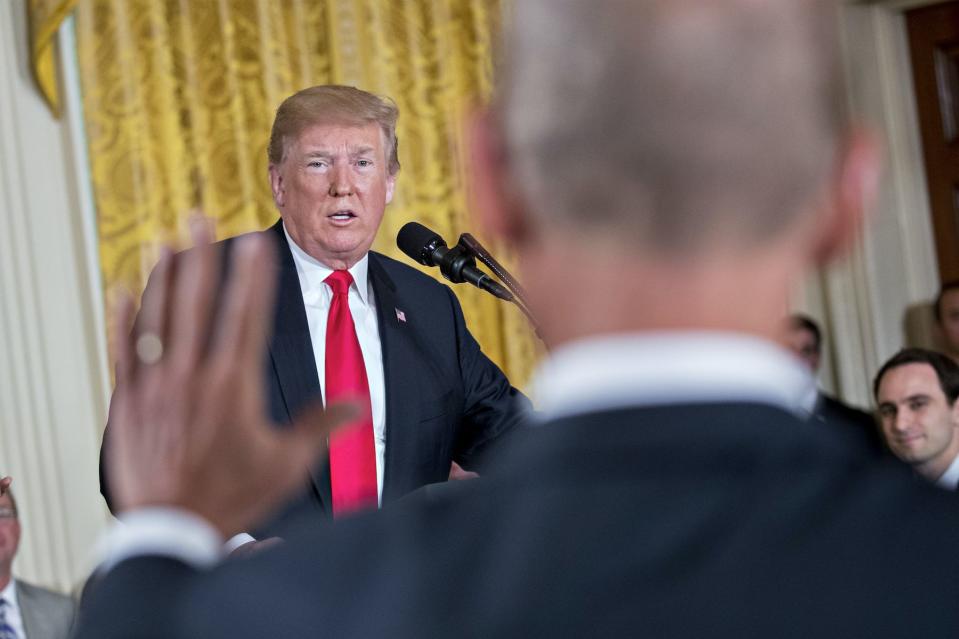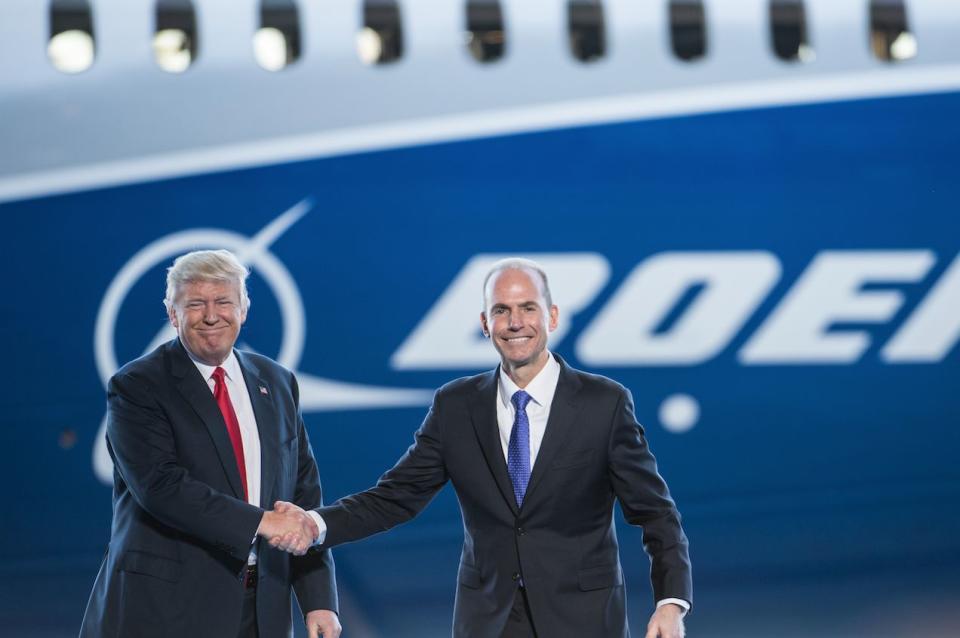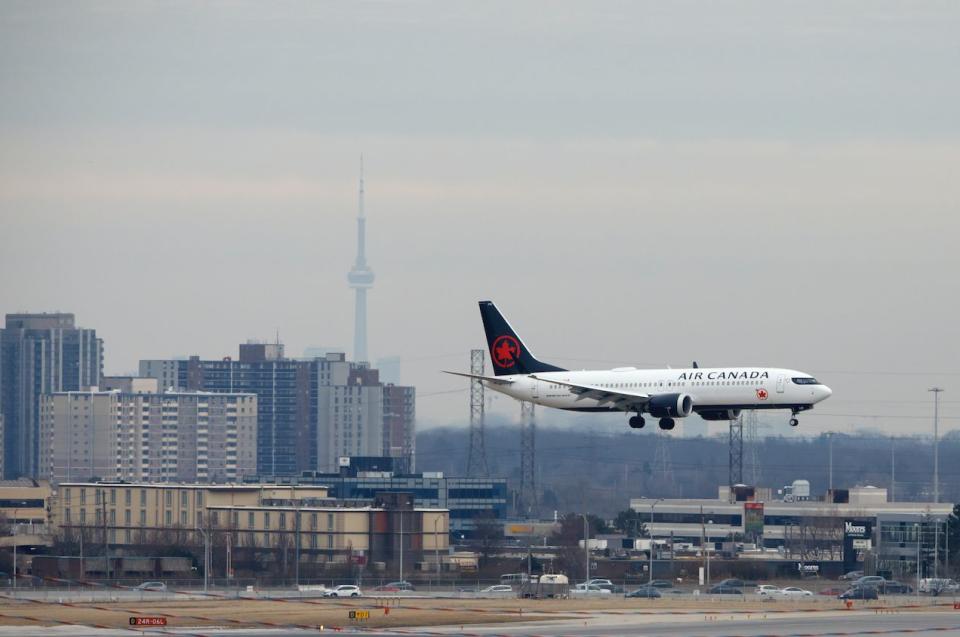Boeing, 'cozy forever' with the U.S. government, under scrutiny after Max 8 crashes
Aviation giant Boeing and the Federal Aviation Administration (FAA) share an intimate relationship.
And that partnership is now under scrutiny as the Chicago-based plane maker’s 737 Max 8 planes were grounded across the world after two fatal Max 8 crashes in Ethiopia and Indonesia within the span of six months.
Boeing and the U.S. government have “been cozy forever,” Jim Hall, the chairman of the National Transportation Safety Board (NTSB) from 1994 to 2001, told Yahoo Finance. “My experience is basically the 1990s forward.”
But now both the Departments of Justice and Transportation reportedly initiated probes related to the regulatory approval processes related to the Max 8. WSJ, which noted that it was “highly unusual for federal prosecutors to investigate details of regulatory approval of commercial aircraft designs,” reported that a D.C. grand jury “issued a broad subpoena dated March 11 to at least one person involved in the 737 Max’s development, seeking related documents, including correspondence, emails and other messages.”
In a letter released late Wednesday, Boeing CEO Dennis Muilenburg stated: “Boeing has been in the business of aviation safety for more than 100 years... We've been working in full cooperation with the U.S. Federal Aviation Administration, the Department of Transportation and the National Transportation Safety Board on all issues relating to both the Lion Air and the Ethiopian Airlines accidents since the Lion Air accident occurred in October last year.”

‘There is a conflict of interest’
Boeing’s relationship with the federal government began with the company’s inception. It sold one of its first few planes to the U.S. Air Force. And through its existence, Boeing has been the biggest plane manufacturer in the U.S.
Some industry insiders argue that the FAA’s cozy relationship with Boeing could have hurried the approval process, suggesting that the steps taken to determine and certify whether the aircraft is airworthy enough were rushed or otherwise compromised.
“There is a conflict of interest — and has been,” former FAA Operations Inspector Bill McNease told Yahoo Finance. “I actually testified before a congressional committee back in 2007 about the conflict between the FAA and different operators.”
OpenSecrets, a website operated by the nonpartisan Center for Responsive Politics, told Yahoo Finance that there are also officials who have rotated between Boeing and the FAA, highlighting two: Thomas McSweeny, who worked as an FAA Chief of Regulation/Certification from 1974 to 2007 before joining Boeing as Director of International Safety and Regulatory Affairs in 2007; and David Traynham, who worked for the FAA from 1998 to 2000 before joining Boeing as Director Commercial Regulatory Affairs from 2000 to 2015.
Former Boeing safety engineer and airsafe.com creator Todd Curtis stressed to Yahoo Finance that “it was quite common for people to move from one side of the aviation world to the other. It's not uncommon to go between the federal government and the private industry.”

Boeing’s contacts are particularly strong with the Trump administration.
In December, Trump named Patrick Shanahan — who served 31 years at Boeing managing the 787 Dreamliner passenger jet — as his acting defense secretary. In February, Boeing nominated Trump’s former U.S. Ambassador to the United Nations Nikki Haley to join its board.
And President Trump, an airplane aficionado and former owner of the now-defunct Trump Shuttle, also has a personal relationship with the Boeing CEO: Muilenburg donated $1 million to Trump’s inaugural committee, visited Trump’s Mar-A-Lago club in December 2016, and promised to build new Air Force One planes for less than $4 billion.
Furthermore, while not uncommon among large companies, Boeing has massively contributed to various political campaigns through PACs and spent millions each year on lobbying.
Last year alone, Boeing spent $15.12 million lobbying all parts of government — including the FAA — according to OpenSecrets, which tracks money in U.S. politics.
In the month of January 2019 alone, disclosures from the Federal Election Commission reveal that the company raised nearly $230,000 — the majority going to various campaigns across the state for their inaugural committee, etc.
Hall, the former NTSB chief, noted that the structure and the relationship between Boeing and the government “has been very close and unfortunately that’s not unusual in the regulatory world of Washington D.C.”

‘The distinction is important’
The FAA has a large role to play in the government’s relationship with Boeing.
The FAA was created in 1958 through a bill introduced by a Democratic senator from Oklahoma, intended to serve as an “independent Federal Aviation Agency to provide for the safe and efficient use of national airspace.”
In 2005, the FAA changed the process of selecting who was designated to certify if a new aircraft met government safety standards. The rule basically allowed manufacturers — like Boeing, not the FAA — to chose their own employees to certify their own planes.
“The distinction is important, because it suggests a slide toward industry self-certification,” Hall wrote in The New York Times in 2013.

OpenSecrets noted that the FAA’s current Associate Administrator for Aviation Safety Ali Bahrami was previously with the trade association American Institute of Aeronautics and Astronautics, which represents around 300 aerospace and defense companies — including Boeing.
Bahrami, an Obama-era appointee, was “very pro industry,” an unnamed FAA safety engineer told Seattle Times in 2017. The source added that Bahrami pushed for the FAA to delegate more safety inspections to the airline manufacturers’ staff.
Multiple experts explained to Yahoo Finance that Boeing’s safety officers knew their profession best and that the time-strapped FAA agents could outsource some of their inspections and retain a more supervisory role.
"The closest parallel you may think of is the medical profession ... where the pharmaceutical companies are the only place who've got the resources to carry out these tests," Ken Button, a transportation expert and public policy professor at George Mason University’s Schar School of Policy and Government, told Yahoo Finance.
“The question is," Button continued, "What tests were carried out [and] how much pressure did Boeing put on the FAA to minimize the tests or to allow them to do them quickly?”

‘As far potential conflict of interest — absolutely’
The FAA previously came under fire for outsourcing too much in 1993 when the Government Accountability Office (GAO) accused the agency of falling behind in “technical competence,” as 95% of the certification work for the Boeing 747-400 was delegated to the manufacturer in 1989.
The unusually high ratio of Boeing to FAA employees working on certifications “was one of my concerns,” Hall said. “I have raised in every occasion when I’ve had the opportunity to — because I think it’s hard of safety process.”
Furthermore, highlighting the risk of graft, FAA employees were found to have broken the law in some cases.
In 2010, an FAA safety inspector pleaded guilty to illegally issuing certifications to a helicopter operator without even inspecting or examining them in exchange for bribes.
In 2018, an FAA-designated airworthiness representative pleaded guilty to falsely representing the conditions of multiple commercial aircraft parts without conducting inspections as well — and also in exchange for bribes.
“I myself have not witnessed any, or even a situation where I thought it was kind of suspicious,” Curtis, the former Boeing safety engineer, said of the inspection process. But “as far potential conflict of interest — absolutely.”
Aarthi is a writer for Yahoo Finance. Follow her on Twitter @aarthiswami.
Read more:
Follow Yahoo Finance on Twitter, Facebook, Instagram, Flipboard, LinkedIn, YouTube, and reddit.

 Yahoo Finance
Yahoo Finance 
